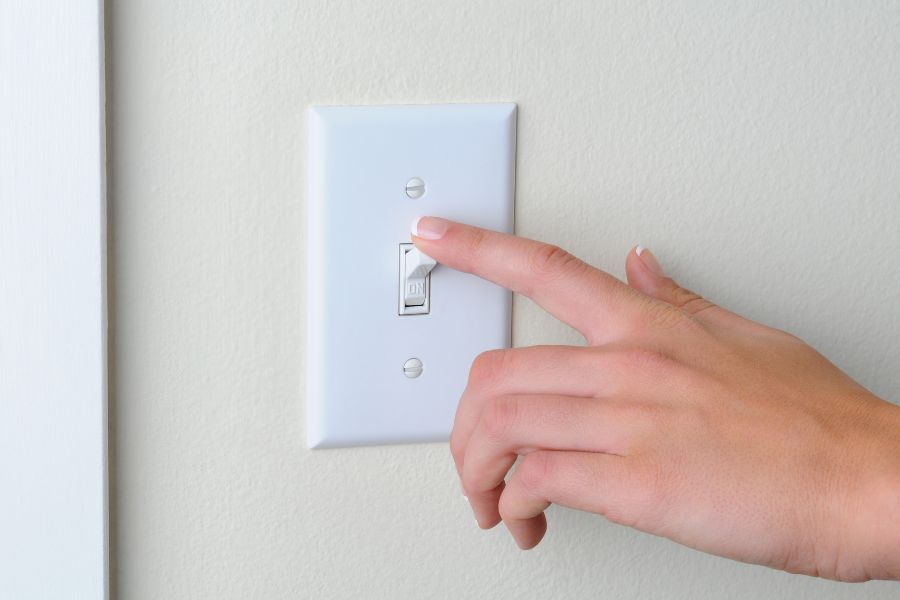Given our current economic climate, people throughout the UK are looking for ways to cut back on expenses.
Check out our recommendations below for 13 quick and easy ways to save on your monthly energy bills. Not only will you save money, but you can also do your part to reduce the amount of energy you use and household use to lessen your carbon footprint. You can save money and help save the planet at the same time!
Contents
- Before you begin
- 13 ways to save on energy bills
- Switch off devices that are in standby mode
- Draught-proof your windows and doors
- Turn off lights
- Replace light bulbs
- Use your washing machine wisely
- Avoid using the tumble dryer
- Instead of taking a bath, take a shower
- Spend less time in the shower
- Use less hot water
- Be smart in the kitchen
- Make sure your dishwasher is full
- Add some insulation
- Look out for energy efficiency grants or free cash
- Final Takeaways
There are several ways for you to save money on your energy bills. Some methods may require a small investment, while others are completely free. Whether you are a renter or a homeowner, we are confident that you’ll benefit from putting some of the 13 tips below into action.
We are all responsible for the amount of energy we consume at home. The 13 tips we have put together could help you save hundreds annually on your energy bills.
That’s not all! As a bonus, we’ve included some helpful resources for you to potentially receive free cash or discounts from the UK government to help with your energy bills! Read this full article to find out how.
Before you begin
Make an effort to understand what’s on your energy bill. Understanding the info on a typical energy bill can go a long way toward helping you understand your household’s current energy use.
Once you’ve done that, jump in and try these 13 ways to save money now.
1. Switch off devices that are in standby mode
By just remembering to switch off your appliances that are in standby mode, you may save about £65 in the UK annually.
The majority of electrical equipment may be unplugged without affecting its programming. Consider purchasing an affordable standby saver or smart plug that enables you to switch off all of your appliances at once.
If you have any questions regarding any appliances, check the instructions. Keep in mind that in order for some satellite and digital TV recorders to maintain track of any programmes you want to record, they may need to be left plugged in.
Take a few minutes to find out which appliances in your house consume the most energy. Then be sure to switch them off wherever possible when they are not in use.
2. Draught-proof your windows and doors
Especially during colder months, you could lose some heat through draughts around doors and windows, gaps in the floor, or the chimney. Older houses are more prone to this, so see what you can do to proof the draughts.
Professional draught-proofing of windows, doors, and plugging of gaps in flooring and skirting boards can cost roughly £225, but it can save up to £125 a year on energy costs. DIY draught-proofing is no doubt less expensive and can certainly help you cut down on heating costs.
3. Turn off lights
It’s simple and free, but this method can be a great money saver. When not in use or when leaving a room, turn off the lights. This will result in yearly energy bill savings of about £25 in the UK. Why not make it a habit to turn off unused lights and only turn them off when the sun goes down?
4. Replace light bulbs
Old and inefficient bulbs could be eating away at your electricity and shooting up your electricity bills. Get any old “incandescent” light bulbs changed in your home to save on electricity.
You might be able to save even more money if you switch to LED bulbs for all the lighting in your house. Nowadays, energy-saving bulbs come in all sorts of shapes, sizes, styles, and colour tones, so you can still save while keeping your home aesthetically pleasing.
5. Use your washing machine wisely
Simply using your washing machine more carefully can cut your annual energy costs by around £34. This simple method, when compounded with the other methods in this article, could really add up to big savings.
Use cold water or the 30-degree cycle on your washing machine as opposed to the higher temperatures. Try not to use the washing machine more than once a week for a whole year.
6. Avoid using the tumble dryer
To save £70 a year, avoid using a tumble dryer and instead dry your clothing on racks indoors or outside in warmer weather. Not only does this tip help you save money, it can also help your clothes last longer and keep their colour. Even if you live in a cooler area, you can hang-dry indoors by setting the clothes racks near windows or well ventilated rooms.
7. Instead of taking a bath, take a shower
A nice warm bath can be very soothing, but did you know this? Even if you swapped just one bath time each week for a shower, you could save around £20 a year on energy bills. And you could still take a bath on the other days of the week!
Just imagine how much you and your family could save if you kept your baths to a minimum and tried to stick to showers as much as possible.
Remember to take safety precautions if taking a shower may not be as accessible to you as taking a bath.
8. Spend less time in the shower
A typical household in the UK could save around £95 a year on energy costs by keeping the length of their showers to just 4 minutes. Even just being careful with the amount of time you spend in the shower could really help you save. So try setting a timer before getting in the shower and make it a habit of keeping your showers to 4-5 minutes.
9. Use less hot water
Whether in the shower, washing your hands, brushing your teeth, or shaving, using less hot water is a very practical way to help you save on energy bills. Determine which parts of your routine could be done with cold water instead and which tasks could be done with lower amounts of hot water. Saving water at home can help your wallet and the environment.
10. Be smart in the kitchen
There are many things we can do to be careful with the amount of energy we consume in the kitchen. One of the most frequently used kitchen appliances is the kettle. A lot of us would readily admit to occasionally boiling the kettle with more water than we intend to use.
By not overfilling the kettle, you may cut your annual power costs by £13. And that’s just one appliance we use in the kitchen, so try to be frugal with how you use your cooking appliances.
Another kitchen tip is to add an aerator to your tap. This allows you to lower the flow of water while maintaining proper washing and rinsing functions. Aerators, which are tiny devices with teeny holes that attach to faucet spouts, are inexpensive and simple to install. You could save £30 annually by using an aerator.
11. Make sure your dishwasher is full
To use less water, only run your dishwasher when it is completely full. You could save £17 by cutting back on the number of runs your dishwasher does each week for a year. If you have some time on your hands, you could also hand wash your dishes. But be sure to use a stopper to avoid wasting water in the process.
12. Add some insulation
Your hot water cylinder should be properly insulated. Even if it currently has thin spray foam or a thin jacket, you may benefit from upgrading the insulation to a British Standard Jacket 80mm thick. You could save £70 annually as a result.
Saving money on your expenses is quick and simple if you insulate your water tank, pipes, and radiators.
13. Look out for energy efficiency grants or free cash
You might be surprised at the free cash available to you to help with energy costs. Do a couple of Google searches and make some phone calls to find out what grants the government is currently offering. In the meantime, we’ve outlined some of the help the UK government is currently offering for energy saving below.
What current help is there from the UK government?
- The UK government has announced that every household will get a £400 energy bill discount in October. This will be applied over six months, with a reduction of £66 in October and November, and £67 every month between December and March 2023. There is no need to see if you are eligible; energy suppliers will apply the discount to all households automatically.
- Typical household bills are also being capped at £2,500 a year – based on average use – from October.
- There is also support for low-income households and those vulnerable to cold-related illness through one-off energy bill rebates of £150 to eligible customers.
- For elderly ones, the Winter Fuel Payment will be made automatically in November and December.
- Cold weather payments are also available for some people during prolonged cold spells.
Final Takeaways
As outlined in this article, there are several ways to save money on your energy bills. Some ways are free, while others may require a small purchase. Yet, you can be sure that all the efforts you make will help you to save significantly in the long run.
Here is the list of all 13 tips to recap:
-
- Switch off devices that are in standby mode
- Draught-proof your windows and doors
- Turn off lights
- Replace light bulbs
- Use your washing machine wisely
- Avoid using the tumble dryer
- Instead of taking a bath, take a shower
- Spend less time in the shower
- Use less hot water
- Be smart in the kitchen
- Make sure your dishwasher is full
- Add some insulation
- Look out for energy efficiency grants or free cash
To begin cutting costs on your energy bills, the important thing is that you get started today. Do your part to save some money and contribute to saving our planet.
If you found this information helpful, please share it with your friends and family. Also, check out our blog for more practical tips like the ones in this article. Thank you!
















